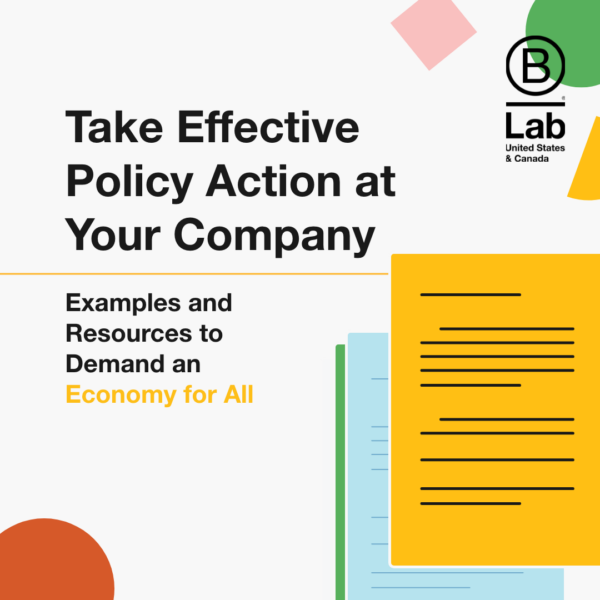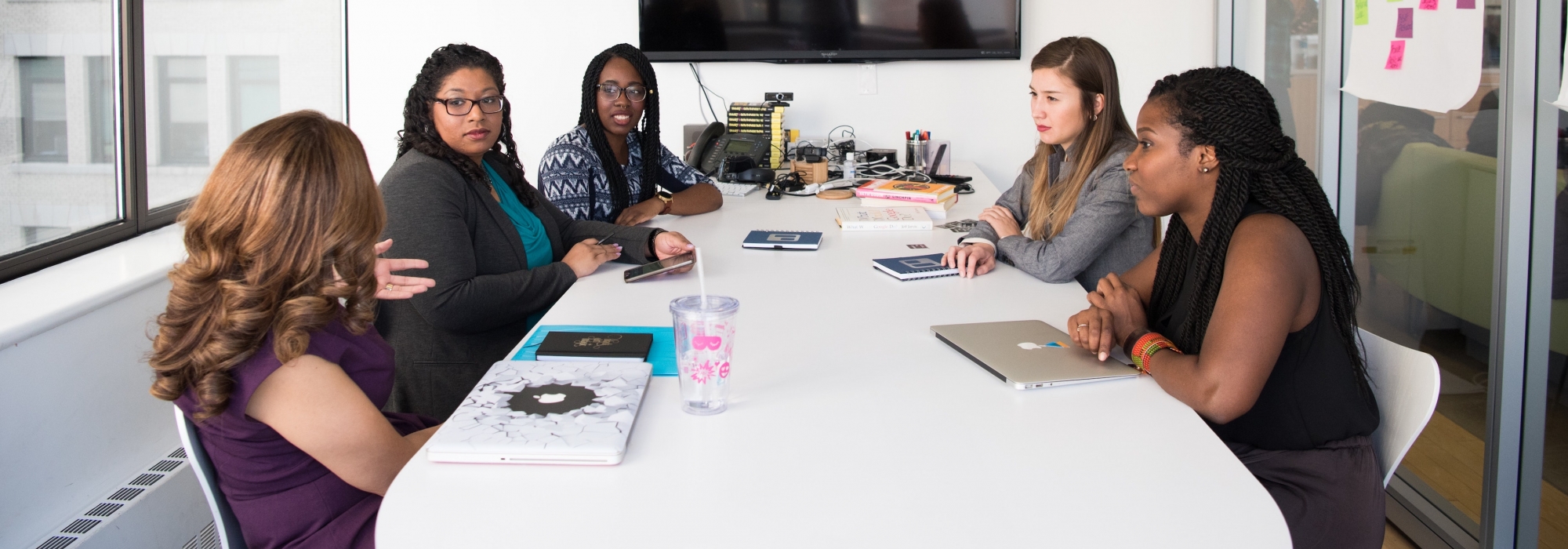How ESG Factors Align with B Corp Values
May 24, 2023
B Corps Speak to Business Benefits of Environmental, Social, and Governance Impact Improvement
The investment and business philosophy that takes into consideration a company’s environmental, social, and governance (ESG) factors has become a focus of U.S. policy debate in recent years. While some policymakers are pushing for policies and laws to limit the use of ESG factors in business or investment decisions, others advocate for protections of ESG considerations for risk management and resiliency.
This includes action at the federal level, where the U.S. Department of Labor (DOL) recently finalized a rule clarifying that, under the Employee Retirement Income Security Act, retirement fund managers may consider ESG factors as part of their investment strategy. This reversed a previous DOL rule that restricted the practice. Congressional Republicans, joined by a small number of Democrats, passed legislation that would have repealed the latest DOL rule, but this was vetoed by President Biden. In addition, the Securities and Exchange Commission is finalizing a new rule that would require most publicly traded companies to disclose certain climate-related information, including carbon emissions and other climate-related financial risks. This rule is expected to be announced this year and likely will be the subject of legislation and litigation to prevent it from taking effect.
While the policy debate looks likely to continue, companies across the United States are demonstrating how the risk-reducing values behind ESG consideration also help create long-term, bottom-line benefits. Investors looking to build more resilient, risk-averse portfolios also are incorporating ESG considerations into investment processes.
Some businesses are going beyond ESG factors to create positive social and environmental impact on stakeholders beyond shareholders — treating employees fairly, creating good jobs, operating sustainability, and contributing to local communities — while also producing a profit. This includes the more than 2,000 Certified B Corporations in the United States, the majority of which are small-to-midsized companies with a stakeholder business model that incorporates and goes beyond ESG considerations to focus on positive impact. What that means in practice varies by company, but the common mission is to value people and the planet as well as profit and to sustain the company’s mission and positive impact.
In industries ranging from seafood to finance to travel and leisure and beyond, the B Corps highlighted in this article share how a focus on ESG impact improvement helps them create more resilient businesses and connections with their workers, customers, and communities.

Take Effective Policy Action at Your Company
This free resource shares how B Lab U.S. & Canada and the B Corp community are building a stakeholder economy and driving collective political action to make the rules of the game more equitable and beneficial for all.
ESG Factors Drive Decision-Making and Business Growth
B Corps speaking up to share the benefits of ESG considerations with policymakers include Luke’s Lobster, a family-owned Maine seafood business with an online market and restaurants in the United States and Asia. Co-Founder Ben Conniff recently shared testimony with a Maine legislative committee considering legislation that would prevent ESG considerations in the investment of Maine Public Employees Retirement System funds.
With more than 250 workers in Maine, Luke’s Lobster processes about 5 million pounds of lobster per year. In his testimony, Conniff said the B Corp also produces a positive impact on its stakeholders, including the environment and workers. “This type of decision-making has made us profitable and enabled our rapid business growth over 13-plus years,” he said. “This type of decision-making allowed us to survive COVID. This type of decision-making is the reason we are one of the only restaurants in Maine with enough employees to be open seven days a week.”
The proposed Maine legislation on preventing ESG considerations for public employee retirement funds would alter Luke Lobster’s business model and harm its bottom line, Conniff said.
“I am certain that if we operated with the goal of maximizing shareholder value by paying our team and suppliers as little as possible, charging our customers as much as possible, and operating in a way that damages our surrounding environment, we would long ago have gone out of business,” Conniff said. “The fact is that considering environmental, social, and governance factors in your business is synonymous with smart long-term financial strategy. Folks who ignore these considerations do so at their own peril, and the peril of their investors.”
Through the years, Luke’s Lobster has proven the worth of its business model to institutional investors, he said. “They know that history has shown that companies who perform well in these impact areas also typically outperform their competitors financially and are therefore better investments,” he said. “This means we’ve gotten more investment dollars while retaining more family ownership of our business, which has propelled our growth and profit while allowing us to double down on the positive impact we have on our community. It’s a virtuous cycle that has allowed us to make Maine stronger.”
Speaking to policymakers on the federal level, California-based Beneficial State Bank CEO Randell Leach said in a recent op-ed in The Hill that financial markets are increasingly recognizing the value of acting in alignment with a broader set of stakeholders. “Why have more and more businesses integrated environmental, social, and governance (ESG) criteria into their models over the last decades? The answer is that they are simply aligning their resources with their stakeholders’ interests — which is efficient, profitable, and both economically and environmentally beneficial,” he said.
With locations in California, Oregon, and Washington, Beneficial State Bank offers stakeholder-driven financial services with a commitment to using deposits to support communities and the planet. Leach said the B Corp aims to prompt others in the financial industry to see the bottom-line benefits of positive social and environmental impact.
“Burying your head in the sand is not a viable approach in a market with finite natural and human resources, changing consumer demands, and increasing climate risk,” Leach said. “Companies that prioritize social and environmental impacts while still generating returns for their shareholders are a model that we should applaud and replicate.”

The Systemic Change Our Economy Needs
A new impact economy is being built, one where businesses prioritize and consider their impact on all the stakeholders they impact — including communities, workers, customers, and the environment. This free report shares how the stakeholder model as practiced by B Corps is gaining global traction and validation.
How ESG Factors Can Drive Resilient Business and Investment Value
B Corps in the financial industry have seen the holistic value of ESG factors over time. Tripp Baird, Co-Founder and Managing Partner of The Builders Fund, said ESG considerations are a framework for the B Corp’s investments to build a better world and a resilient portfolio. The fund partners with companies whose business models address environmental and social challenges. Its current investments include Acelero Learning, an outcomes-driven early childhood education platform; PosiGen, a residential solar and energy efficiency provider for low- to moderate-income families; and B Corp Traditional Medicinals, a wellness tea company that nurtures connections with the herb-sourcing communities in its supply chain.
“In our experience, purpose-built companies can outperform their peers by leveraging their mission and values to attract and retain talent, increase employee and consumer engagement, earn media, drive customer loyalty, and lower their cost of customer acquisition,” Baird said.
“We believe incorporating better operating practices while considering ESG risk factors makes us better fiduciaries of our investors’ money, and that improvements on these dimensions drive better decision-making and, ultimately, better returns.”
In its investments with private companies, Builders Fund works with management teams to create economic and stakeholder value, Baird said. This includes filling board seats that help drive strategic decision-making. “In Builders’ experience, an engaged and dynamic board of directors and advisors can amplify organizational purpose and ESG priorities, holding the tension between long-term aspirations and short-term realities, as well as integrating the perspectives of multiple stakeholders,” he said.
With each investment, Baird said Builders Fund works to create programs to share equity value creation with the management teams and employees. “These profit pools create and maintain economic value for those who are most integral to the success of the company and add value on top of living wages, health care coverage, paid parental leave, and other bonuses and benefits,” he said.
Internally, Builders Fund uses the B Impact Assessment to set baseline standards, track progress toward goals, and aggregate impact across investments, said Amelia Ahl, Director of Impact. The values of justice, equity, diversity, and inclusion guide its approach in selecting partners and supporting leadership at portfolio companies. “We believe that equitable and inclusive practices are not only better for businesses and people alike, but also demonstrably improve performance,” Ahl said. “Our hiring process ensures that a representative cross-section of the population is interviewed for any open position.”
How B Corp Measurements Hone Business Focus on ESG Impact
“I think of B Corp measurements as business measurements of our humanity,” said Jared Meyers, Chairman of Legacy Vacation Resorts (LVR), a Florida-based B Corp that operates family resorts in four states. He said these measurements of humanity are embedded in several of the company’s policies and practices:
- Making sure employees can afford rent, clothing, and food through a living wage reflects caring for a fellow human being.
- Ensuring customers can travel with significantly less harm to the environment demonstrates business responsibility instead of shifting the burden to them.
- Volunteering and supporting Destination Stewardship principles demonstrates to communities that LVR exists to lift them up rather than to profit from them through exploitation.
“These are all B Corp values that the B Corp Impact Assessment has helped us strengthen through measurement and focus,” Meyers said, adding that LVR has been able to establish stronger connections with stakeholders as a B Corp that operates with compassion and reciprocity, offering values-aligned workplaces and products. “When we care for each other, our relationships grow, and when we make our business culture about caring, we create a bond with our stakeholders that delivers true belonging, appreciation, and a shared prosperity. These underpinnings have led to our resilience and our incredible financial success these past few years.”
LVR and other Florida companies share ESG best practices and lessons as part of Florida for Good, a state network of B Corps and other purpose-driven businesses. They include Ocquatics Swim School, where Founder Miren Oca said gaining B Corp Certification formalized the company’s commitment to ESG principles. “As a small business, Ocaquatics has chosen to adopt the UN’s Sustainable Development Goals (SDGs) as our framework for working toward social and environmental sustainability,” she said. “We start with small, achievable goals and actions.”
The company’s 2022 Impact Report serves as a public record of its commitment to and progress on the SDGs, Oca said, with other resources the B Corp shares in encouraging its stakeholders to follow suit. “We lead by example and amplify the impact of our actions through communications to our families and the community, and with our social media voice,” she says. “We educate and inspire our team members and families to work toward the SDGs at home and in the community.”
-

Business Strategy
Our Economic System Isn’t Working: The Global Crisis Drives a Renewed Market Focus on Stakeholder Capitalism
Read More -

Business Strategy
Policy Reform: Collective Action to Change the Rules of Business to Benefit Governance Model
Read More -

Champions Retreat
Shaping a Stakeholder Economy Through Certifications and Supplier Partnerships
Read More -

Sign Up for our B The Change Newsletter
Read stories on the B Corp Movement and people using business as a force for good. The B The Change Newsletter is sent weekly.
